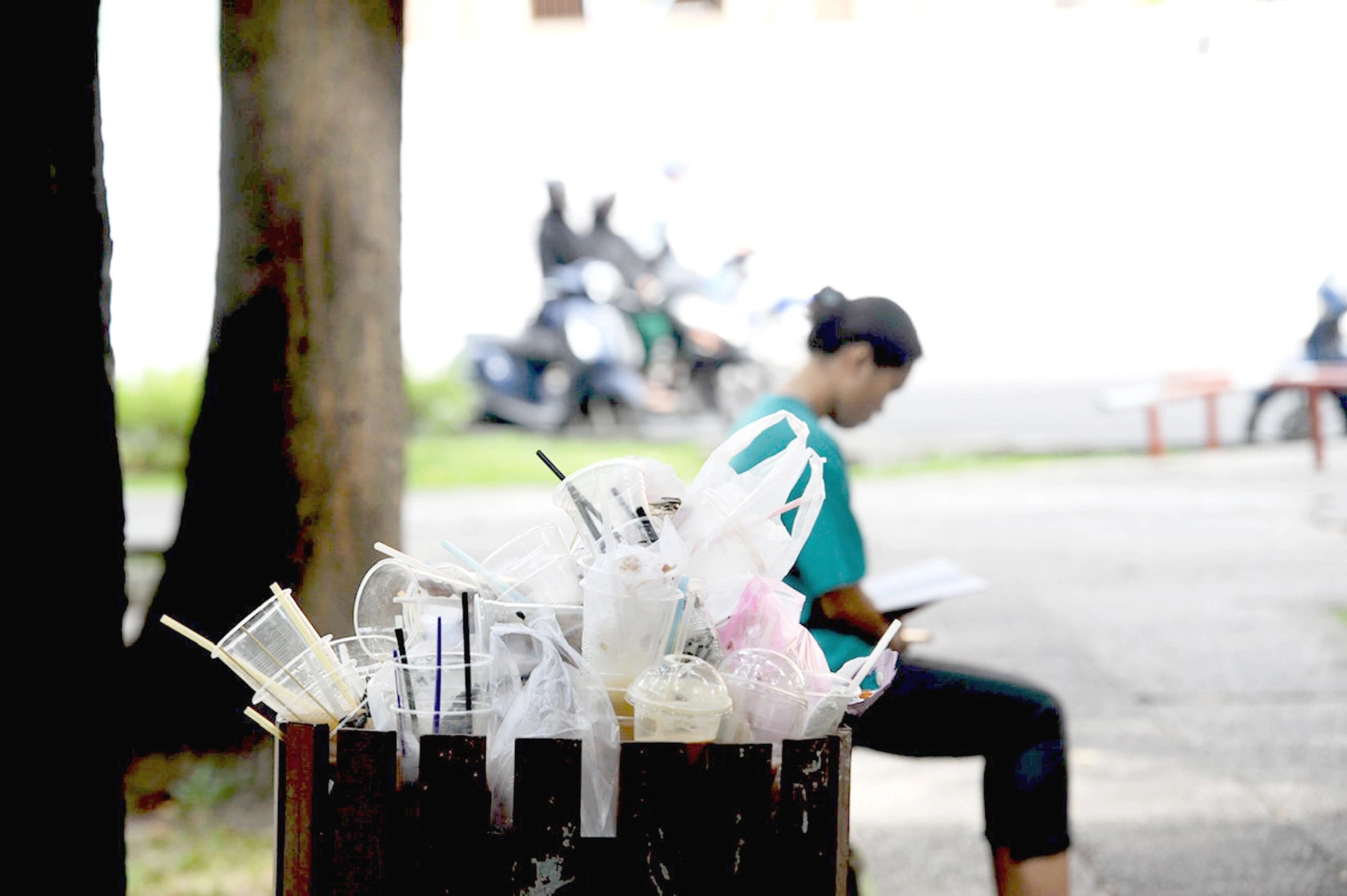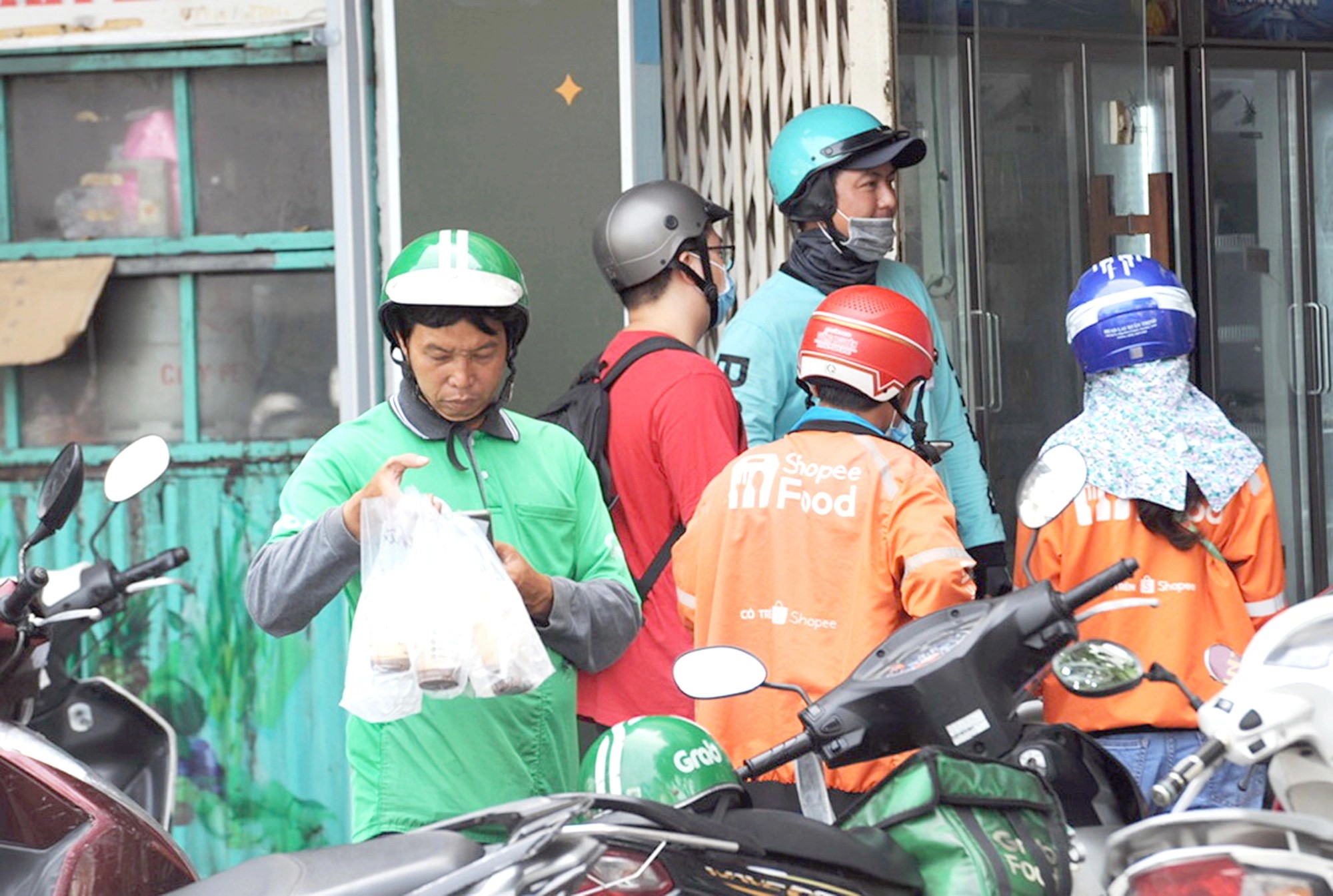Despite being well-aware of the potential harm caused by plastic waste, delivery apps and online retailers in Vietnam often cite convenience and cost-efficiency as justifications for their continued use of this material.
The adoption of eco-friendly packaging materials is hindered by the considerably higher costs compared to traditional plastic alternatives.
Shippers also shocked with plastic waste
As an online foodie, Quang Tran, a resident of District 1, Ho Chi Minh City, said she receives one or two packages from online orders as well as two or three grocery orders every day.
Although she knows her orders create waste, she orders daily because it is convenient, and she needs it.
"I have tried to limit waste by not taking plastic packaging when I can.
"I also avoid plastic dinnerware as I already have my own. However, there are only a few online stores that offer such options via the app.
"I also take the used plastic bags for reuse to reduce waste. Nevertheless, there is still a lot of waste," added Tran.
Ngoc Thien from Binh Thanh District said that although she tries to recycle the boxes or parcels left over from online orders, she can only use less than 50 percent of them due to the way the vendor packs the goods.
She further explained that the sellers have to use so much tape to wrap the goods carefully.
Therefore, they cannot recycle as many as they want after cutting them out with scissors. In some cases, they even have no choice but to dispose of the boxes and packaging material.
Shippers also complain about online stores using so many plastic boxes or bags. For example, at least three to four plastic items are used for one portion of food.
Despite the short-term convenience of such packaging materials, the waste they generate can cause great harm to the environment in the long term.
One day, at dinner time, Tuoi Tre reporters came to a store on Cach Mang Thang Tam Street (District 3), which is well known on food delivery apps such as Shopee Food and Grabfood.
 |
| A park in District 1, Ho Chi Minh City is littered with plastic waste on the morning of November 4, 2023. Photo: Hai Quynh / Tuoi Tre |
In just ten minutes of their arrival, dozens of shippers went in and out with different types of plastic bags of food.
According to a male employee, the store takes an average of 300-400 online grocery orders per day. On some days, when there are special promotional programs, the number of orders can double.
Each order is carefully prepared by the staff by packing the different food items in many plastic bags.
As a result, the plastic waste from these orders can run into the hundreds or thousands at stores that sell food through online apps like this one.
It took a while for the reporters to find a store that sells fast food in paper bags. It was the Mixue store on Ly Thai To Street (District 10).
However, they later learned that the store was running a promotional program that prompted them to use paper bags.
Trang, the store's manager, told Tuoi Tre (Youth) newspaper that the promotional program cost them so much that they did not even benefit from giving paper bags unless the value of an order was over VND50,000 ($2.06).
"Our store only runs a promotional program. Otherwise, we usually use plastic bags to save costs," Trang said.
This is in line with what Tuoi Tre reporters found when they looked around the market.
Apart from organic food stores or high-end grocery stores that use packaging made from eco-friendly materials, other stores consider this type of bag as a way to attract customers.
Therefore, many stores only use plastic bags for a few rare promotions. The higher cost of "green" utensils makes the products more expensive and therefore less competitive, which discourages sellers from using them.
For example, a pack of 50 styrofoam boxes with a volume of 600ml costs VND35,000 ($1.44), while the same number of boxes made from bagasse are sold at a higher price of VND113,000-165,000 ($4.64-6.78) on Lazada, Tiki, and Shopee e-commerce platforms.
Challenges of eco-friendly materials
Speaking to Tuoi Tre, representatives from food delivery services acknowledged that it is a necessary trend to use safe and environmentally friendly food packaging materials, but it is not easy to implement in reality.
The issue is further complicated by the dominant convenience of plastic packaging in the market. Food delivery apps can only encourage customers to limit the use of plastic utensils when they are not absolutely necessary.
For example, when someone orders food through the Grabfood app, they can automatically choose not to get disposable utensils by doing nothing. Unfortunately, few people are interested in this function.
The reason for not knowing about this option lies in the priorities of online stores or restaurants that focus on productivity and speed and therefore resort to one option for all to save time accordingly.
So, if people have no need for plastic utensils, they throw them away without thinking about the impact on the environment.
Any potential solutions?
Dr. Truong Ai Nhi from the Institute for Circular Economy Development (ICED) said that the prices of eco-friendly packaging materials such as bagasse or banana fiber (manilla fiber) are higher than those of normal packaging materials.
More importantly, the supply of such packaging is not sufficient to meet the high demand in the market. So, this alternative option will not be able to achieve optimal efficiency in a short period of time.
In view of the existing challenges, Nhi emphasized that the most important thing now is the committed participation of all relevant parties.
To solve this problem, Nhi believed that in the field of online food delivery, for example, it is necessary to build an integrated ecosystem that connects packaging manufacturers, packaging users, and waste collection agencies to coordinate the entire waste collection and processing process.
Furthermore, to change customer behavior and packaging materials, one should work with things that are easiest to do.
According to Nhi, this can be done, for example, in luxury restaurants with a large number of customers who are willing to pay more to use environmentally friendly packaging.
In the next phase, this regulation can be applied to small and medium-sized stores or food suppliers. During the process, the competent authorities are responsible for coordinating, monitoring, and promoting the application.
In conclusion, the convenience of online food delivery comes at an environmental cost, primarily due to the excessive use of plastic packaging. While the adoption of eco-friendly materials is challenging, a collective effort from consumers, delivery services, and authorities is essential to mitigate this issue.
Encouraging consumer behavior change and promoting the use of environmentally friendly packaging materials, starting with high-end restaurants, can contribute to a more sustainable future.
It will be more fun if you go out to eat
Pham Minh Nhat, 23, from District 5, Ho Chi Minh City, has made it a habit to go out and eat with her friends every weekend since she got a job and moved out.
Nhat works as a freelancer and mainly online, which makes her, who is an extrovert, feel uncomfortable, and her mental health is affected as a result.
To overcome her bad mood, Nhat tries to schedule her work so that she has time to invite friends to go out and do things on weekends.
The young woman tries to eat out as often as possible to have more opportunities to talk to more people.
So instead of ordering drinks online, she often opts for a café where she can work as well as talk to others and see the surroundings.
Vietnam disposes of around 1.8 million tons of plastic waste every year
According to the Media Center of the Vietnamese Ministry of Natural Resources and Environment, Vietnam throws away around 1.8 million tons of plastic waste every year.
This includes 30 billion plastic bags, 80 percent of which are disposed of after a single use.
Vietnam ranks 4th among the top 20 countries dumping the most plastic waste into the oceans, with 0.28-0.73 million tons per year, accounting for 6 percent of the amount of plastic waste thrown into the oceans worldwide.
Like us on Facebook or follow us on Twitter to get the latest news about Vietnam!





















































